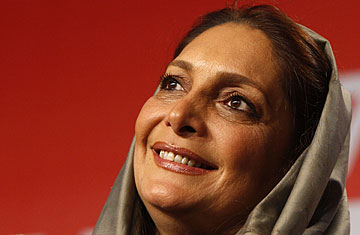
Iranian director Manijeh Hekmat at the 58th International Berlinale Film Festival on Feb. 14 in Berlin
A few days ago, veteran Iranian filmmaker Manijeh Hekmat resolved her dilemma over the parliamentary elections, and began organizing support for embattled reformist candidates. Whether to participate or ignore the poll has been a tricky question for many reformist-leaning Iranians: On the one hand, they have become apathetic toward elections managed in a way that has made inevitable a victory by conservative candidates; on the other hand, they fear that their inaction could return a uniformly conservative majlis, or parliament. For Hekmat and like-minded colleagues in the film industry, the latter outcome could only prolong the dark clouds that hang over their artistic activity.
For the past three years, independent filmmakers have faced growing obstacles in obtaining permits and funding to make their movies. "Politics has a direct impact on my art. I can't stay indifferent. Either I get involved or I lose," she says, sitting in her office that she has temporarily converted into the Artists' Headquarters of Reformists. For her plan of action, Hekmat spent one and a half days on the phone and got the signatures of more than 170 of some of Iran's most renowned film people on a pro-reform statement — the first time that a collective statement by artists has been issued in support of a political coalition in Iran. The communiqué states in part, that the cultural difficulties and turbulences afflicting Iran right now are in need of "fundamental changes," and that "this transformation can only come about on the peaceful, reformist, democratic path."
Even the wording of the statement makes plain the reformists' dilemma: "Our vote for the reformists isn't an approval stamp for the procedure of the elections, but it is the declaration of our faithfulness to the culturally-centered philosophy of the reformists."
Since the signatures were published last Monday, Hekmat has had little sleep. There has been an onslaught of attacks against her in the conservative press, claiming that she has forged many of the signatures. "I don't understand," she says incredulously. "All I have done is encourage people to vote for the reformists, who are legitimate candidates that have been approved by the Guardian Council [the clerical body that vets candidates for election]. It's not like I have boycotted the elections!"
Amid the controversy, many of the signatories claim that they have been contacted by Iranian TV networks and threatened that they will lose their jobs unless they deny that they ever signed the statement. All week, conservative newspapers have run lists of names of signatories that they claim have denied their ever supporting the initiative. One famous actor, Parviz Parastoui, even published an open letter declaring, "Manijeh Hekmat has no right to decide for me." Others have reiterated their support.
"Some people have no choice," says documentary filmmaker Mojtaba Mirtahmasb. "If you're an actor for TV and you get a call saying you will lose your livelihood, you may have no choice but to accept to deny you ever signed." He didn't sign the letter, but that's because, he says, he's become disillusioned with politics. He did sign a petition earlier this year, however, to protest recent cultural policies that have severely limited support for independent filmmakers. Mirtahmasb himself spent three years preparing a major feature film production, only to see his permit withdrawn the day he was ready to shoot.
Other letters of protest have been issued over the past year. Filmmakers complain that what used to be a selection jury at the country's prestigious Fajr Film Festival has now become a "discrimination jury." This year's festival selection centered mostly on religious themes and films dealing with the Iran-Iraq war.
Despite the immense pressures on filmmakers in recent days, Hekmat remains optimistic. "Cinema has deep roots in this country. We're just going through hard times. People in Iran's film industry are stronger than to falter at this," she says.
Even Mirtahmasb, whose apathy is in part rooted in his frustration over three years of lost work, betrays a hint of struggling with the reformist dilemma: He remains intensely curious about whether others will vote.
